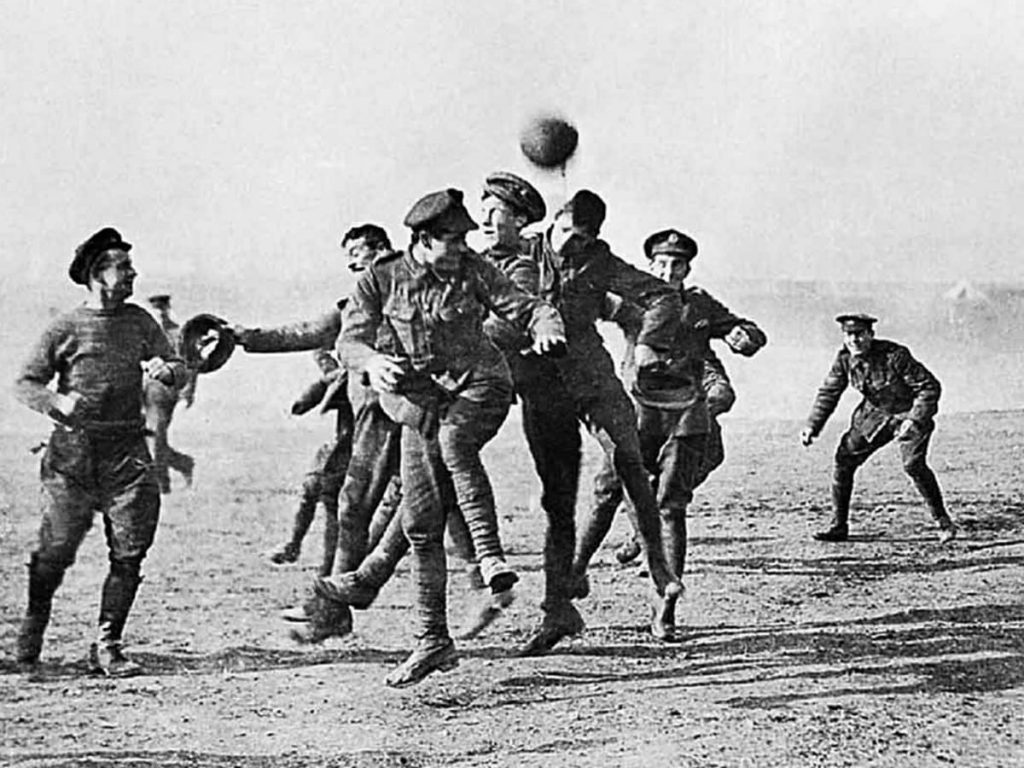
Throughout this season of Advent our focus is “The Story of Christmas in 20 Words.” On each of the 20 weekday mornings ending on Christmas Eve, we’ll spotlight a single word from the Gospel accounts that helps us ponder more deeply the birth of Jesus.
10. Peace
It became known as the Christmas Truce.
On December 24, 1914, hundreds of thousands of young men crouched in muddy trenches that zig-zagged almost all the way across Europe. The politicians and generals who had launched the “war to end all wars,” as World War I came to be known, had expected the fighting to be over by Christmas.
But after four months of non-stop slaughter, the German and Austrian troops on one side and the British, French, and Russians on the other had come to the grim realization that this extraordinary conflict would not end any time soon. As winter settled over Europe, the combatants settled into the stalemate of trench warfare.
British machine gunner Bruce Bairnsfather was pinned down with his regiment in a part of Belgium called Bois de Ploegsteert. His days and nights were marked by a never-ending cycle of sleeplessness, fear, and cigarettes too wet to light.
“Here I was, in this horrible clay cavity,” he later wrote, “…miles and miles from home. Cold, wet through and covered with mud.” There didn’t “seem the slightest chance of leaving – except in an ambulance.”
Later that day, Bairnsfather heard sounds coming from the enemy trenches. German soldiers were singing Christmas carols. It was surreal to hear “Silent Night” after yet another day in which both sides had tried to kill their opponents.
One of the Germans tentatively called out in English, “Come over here.” After a pause, a British sergeant replied, “You come halfway, I come halfway.”
And that’s what they did.
Disobeying the orders of their commanders, soldiers from both sides bravely emerged from their trenches waving white flags. They walked hesitantly into the No Man’s Land between the trenches.
There was laughter and singing. Soldiers shook hands. They exchanged cigars and toasts. One Welsh regiment received a barrel of Christmas beer from the Germans who were entrenched directly opposite their line. A British soldier set up a makeshift barber shop and charged the Germans a couple cigarettes each for haircuts.
Some of the Germans helped the British locate their dead comrades – there were scores of them in No Man’s Land – and carry them respectfully back to their trenches. The Brits returned the favor.
“We did not fire that day,” remembered one British soldier, “and everything was so quiet it seemed like a dream.”
A Scottish Highlander produced a soccer ball. Within minutes the two armies were playing what can only be described as an “international friendly” on the frozen ground between the trenches. Historian Rick Beyer writes: “The soccer game, of course, had no referee; but the men on both sides took a perverse pride in playing precisely according to the rules.” The Germans prevailed, three goals to two. The photo above captures a moment from one of the most extraordinary sporting matches in history.
And the generals? They were furious.
The soldiers were ordered back to their trenches. Some of those who participated in the fraternization were court-martialed. The brutal sameness of the fighting and killing resumed on December 26, and nothing like a spontaneous truce ever happened again. The war finally ground to a halt on November 11, 1918.
People acquainted with even the barest details of the original Christmas story know that “peace on earth, goodwill toward men” is what the angels sang to the shepherds outside Bethlehem. Those words from Luke 2:14, as rendered by the King James Version (1611), have been immortalized in numerous Christmas songs and carols.
In recent years, however, an almost universal scholarly consensus has emerged that Luke 2:14 should actually be translated like this: “Peace on earth for those on whom his gracious kindness rests.”
That makes a world of difference.
The older translation has lent the impression that if Jesus is who he says he is, there should be peace on earth right here and right now. Goodwill should fuel every human relationship.
Why, then, do wars continue? Why so many angry outbursts, school shootings, and personal vendettas? Why so much domestic violence? And why is public incivility so raw that we hesitate to let our children watch the news? No wonder cynics consider the promises of Christmas to be little more than a hollow sham.
But God’s promise of global peace shall one day prevail over the new heavens and new earth.
In the meantime, because Jesus came into the world, any one of us can experience peace with God in the here and now. The Hebrew word for “peace,” shalom, means much more than just a cessation of hostilities. It connotes a deep-seated sense of wellbeing, even in the midst of difficult circumstances – all because of God’s kindness and grace.
The message of the angels is that those who enroll as followers of the newborn Prince of Peace can now become peacemakers in this broken world, sharing the peace that God is willing to share with each of us.
What does that mean this December?
It means we’re all called to help bring about a Christmas Truce.
Meet someone halfway. Invite them into the No Man’s Land between your absolutely right way of seeing things and their absolutely right way of seeing things. Dare to hope that more good will come from just being together – sharing handshakes, conversation, food, and laughter – than lobbing grenades into each other’s trenches.
Such a meeting may seem impossible. As that British soldier put it, it would seem like a dream.
But of such dreams the world can be remade.
All it takes is one brave person stepping forward with a white flag.
